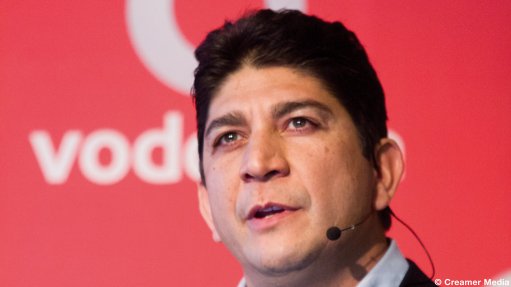
Vodacom CEO Shameel Joosub
Telecommunications group Vodacom planned to challenge the legal validity of the process that laid out aggressive asymmetry rates as the Independent Communications Authority of South Africa (Icasa) implemented a new mobile termination rate (MTR) glide path.
This comes as Vodacom reported a 24.1% decline in interconnection revenue, stunting the group’s service revenue for the quarter to December.
Last month, Icasa introduced a more aggressive special asymmetric dispensation that favoured smaller mobile players with less than 20% of the market, allowing them to charge dominant players, such as Vodacom and MTN, the maximum rates, while only being charged the lower rate themselves.
Icasa believed this would enable smaller operators to benefit more from the revised framework and create a conducive environment for smaller players to invest in infrastructure and effectively even the playing field.
The final termination rates, which were gazetted on Tuesday, would see the MTRs halved to 20c by March 1, 2014, before declining to 15c in March 2015 and 10c by March 2016, while the asymmetry would be set at 44c, before declining to 42c in 2015, 40c in 2016 and 20c in 2017.
MTN and Vodacom slammed the move, warning of the implications of the uneven rates.
MTN maintained its stance that the asymmetry rates were “unsubstantiated” and had previously warned of cuts in investment owing to the lower rates.
Vodacom said the termination rates should be determined “in accordance with the procedures as set out in the Electronic Communications Act, which requires that the rates be cost based”.
“Cost-based rates are important to sustain our ongoing investment strategy. We have concerns about the process used to determine these published rates,” Vodacom CEO Shameel Joosub said.
QUARTERLY RESULTS
Vodacom said its strategy of sustained network investment was key to the growth of the overall business, while still driving down the cost to communicate.
During the quarter to December, Vodacom added 12.3% group customers, reaching 56-million and reported a 3.4% underlying growth of group service revenue to R16.24-billion, driven by data revenue growth of 40.7%.
Service revenue in South Africa improved for the third consecutive quarter, increasing 0.6% to R12.6-billion, on the back of strong growth in data and prepaid customer revenue, with lower prices offset by 23.3% higher voice traffic and a 31.2% growth in data revenue.
Excluding the effect of lower MTRs, which resulted in a 24.1% fall in interconnection revenue, South Africa’s service revenue grew by 3.4%.
The South African business experienced total revenue growth of 6.6% to R16.5-billion during the quarter under review, boosted by a 26.9% growth in equipment revenue.
Meanwhile, Vodacom’s international operations continued to make increasingly significant contributions to the group, with active customers increasing 22.8% to 25-million – 44.7% of the overall group active customers.
International service revenue rose 32.6% to R3.7-billion, mostly owing to the success of the company’s street vendor channel, expanded network coverage and competitive bundled offers.
“Our international operations have also continued to respond well to our network investment strategy and the revamp of our commercial offerings,” Joosub noted.
NEW APPOINTMENT
Vodacom on Tuesday appointed Vodafone Egypt CEO Hatem Dowidar nonexecutive director, effective February 5.